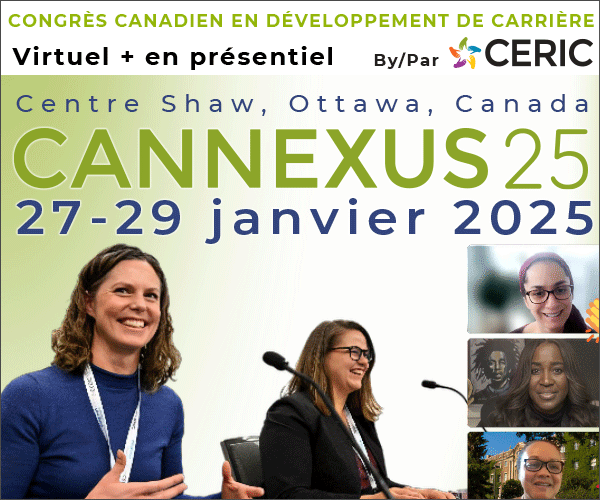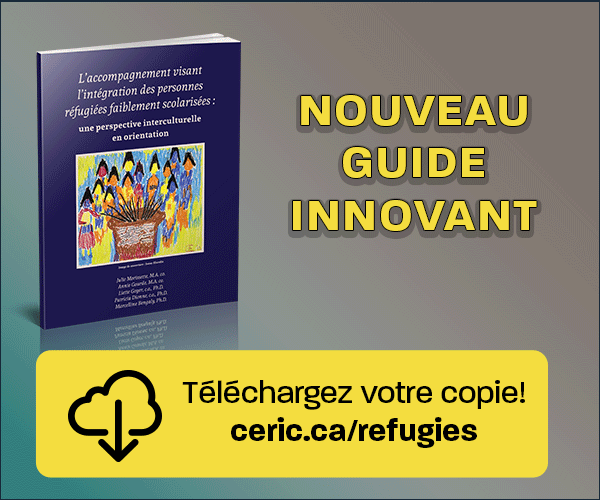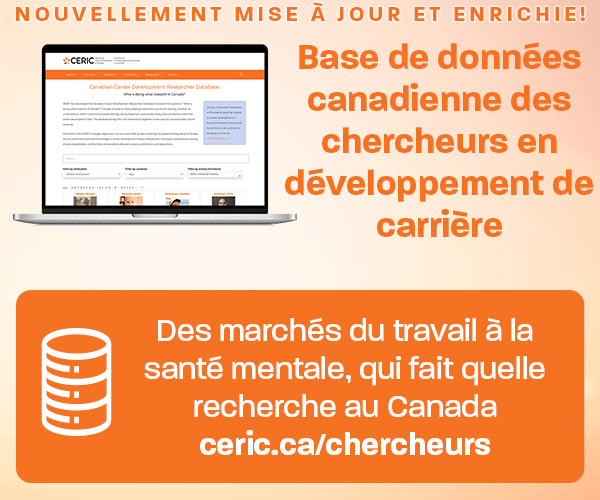L’impact des forums de discussion en ligne axés sur la carrière
DOI :
https://doi.org/10.53379/cjcd.2021.141Mots-clés :
les forums de discussion en ligne , apprentissage professionnel, identité professionnelle, enquête communautaire, l'enseignement supérieurRésumé
This mixed method research project investigated the impact and utility of online discussion forums (ODFs) hosted by the The Open University (UK) Careers and Employability Services in supporting the career identity, learning and development of Open University students. Despite a substantial evidence base underpinning the use of ODFs within online learning environments for pedagogical applications there is a paucity of scholarly activity linking student participation within ODFs for specific career learning and career development purposes. In addressing this gap, this novel research draws upon influential career theory relating to career learning and career identity to situate student and staff perceptions of careers focussed ODFs and their impact. To achieve this the interactions of higher education students were analysed within six selected ODFs whilst more in-depth insights were captured through student questionnaires and staff interviews. The findings of this study demonstrate the wide-ranging benefits of ODFs for the growth of career identity and learning, and also as a space where critical community inquiry can occur, contributing to deeper approaches to learning for participants.
Références
Bradshaw, C., Atkinson, S., & Doody, O. (2017). Employing a Qualitative Description Approach in Health Care Research. Global Qualitative Nursing Research, 4, 233339361774228. https://doi.org/10.1177/2333393617742282
Braun, V., & Clarke, V. (2006). Using thematic analysis in psychology. Qualitative Research in Psychology, 3(2), 77–101. https://doi.org/10.1191/1478088706qp063oa
Brown, J. S. (2000). Growing Up: Digital: How the Web Changes Work, Education, and the Ways People Learn. Change: The Magazine of Higher Learning, 32(2), 11–20. https://doi.org/10.1080/00091380009601719
Burgess, A., & Ivanič, R. (2010). Writing and Being Written: Issues of Identity Across Timescales. Written Communication, 27(2), 228–255. https://doi.org/10.1177/0741088310363447
Castaño-Muñoz, J., Duart, J. M., & Sancho-Vinuesa, T. (2014). The Internet in face-to-face higher education: Can interactive learning improve academic achievement?: The Internet in face-to-face higher education. British Journal of Educational Technology, 45(1), 149–159. https://doi.org/10.1111/bjet.12007
Garrison, D. R., Anderson, T., & Archer, W. (2001). Critical thinking, cognitive presence, and computer conferencing in distance education. American Journal of Distance Education, 15(1), 7–23. https://doi.org/10.1080/08923640109527071
Garrison, D. R., & Cleveland-Innes, M. (2005). Facilitating Cognitive Presence in Online Learning: Interaction Is Not Enough. American Journal of Distance Education, 19(3), 133–148. https://doi.org/10.1207/s15389286ajde1903_2
Griffin, L., & Roy, J. (2019). A great resource that should be utilised more, but also a place of anxiety: Student perspectives on using an online discussion forum. Open Learning: The Journal of Open, Distance and e-Learning, 1–16. https://doi.org/10.1080/02680513.2019.1644159
Gunawardena, C. N., & Zittle, F. J. (1997). Social presence as a predictor of satisfaction within a computer‐mediated conferencing environment. American Journal of Distance Education, 11(3), 8–26. https://doi.org/10.1080/08923649709526970
Hrastinski, S. (2009). A theory of online learning as online participation. Computers & Education, 52(1), 78–82. https://doi.org/10.1016/j.compedu.2008.06.009
LaPointe, K. (2010). Narrating career, positioning identity: Career identity as a narrative practice. Journal of Vocational Behavior, 77(1), 1–9. https://doi.org/10.1016/j.jvb.2010.04.003
Law, B. (1981). Community interaction: A ‘mid-range’ focus for theories of career development in young adults. British Journal of Guidance & Counselling, 9(2), 142–158. https://doi.org/10.1080/03069888108258210
Law, B. (1999). Career-learning space: New-dots thinking for careers education. British Journal of Guidance & Counselling, 27(1), 35–54. https://doi.org/10.1080/03069889908259714
Lengelle, R., & Meijers, F. (2014). Narrative identity: Writing the self in career learning. British Journal of Guidance & Counselling, 42(1), 52–72. https://doi.org/10.1080/03069885.2013.816837
Meijers, F., & Lengelle, R. (2012). Narratives at work: The development of career identity. British Journal of Guidance & Counselling, 40(2), 157–176. https://doi.org/10.1080/03069885.2012.665159
Ouirdi, M. E., El Ouirdi, A., Segers, J., & Henderickx, E. (2014). Social Media Conceptualization and Taxonomy: A Lasswellian Framework. Journal of Creative Communications, 9(2), 107–126. https://doi.org/10.1177/0973258614528608
Pendry, L. F., & Salvatore, J. (2015). Individual and social benefits of online discussion forums. Computers in Human Behavior, 50, 211–220. https://doi.org/10.1016/j.chb.2015.03.067
Savickas, M. L. (2012). Life Design: A Paradigm for Career Intervention in the 21st Century. Journal of Counseling & Development, 90(1), 13–19. https://doi.org/10.1111/j.1556-6676.2012.00002.x
Scherer Bassani, P. B. (2011). Interpersonal exchanges in discussion forums: A study of learning communities in distance learning settings. Computers & Education, 56(4), 931–938. https://doi.org/10.1016/j.compedu.2010.11.009
Tan, K.-E. (2017). Using online discussion forums to support learning of paraphrasing: Online discussion forums for learning paraphrasing. British Journal of Educational Technology, 48(6), 1239–1249. https://doi.org/10.1111/bjet.12491
Tomlinson, M. (2017). Forms of graduate capital and their relationship to graduate employability. Education + Training, 59(4), 338–352. https://doi.org/10.1108/ET-05-2016-0090

Téléchargements
Publié-e
Comment citer
Numéro
Rubrique
Licence
(c) Tous droits réservés La Revue canadienne de développement de carrière 2021

Cette œuvre est sous licence Creative Commons Attribution - Pas d'Utilisation Commerciale - Pas de Modification 4.0 International.











